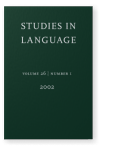Vol. 26:1 (2002) ► pp.67–123
Functional theories of island phenomena
The case of Japanese
This paper examines island effects in Japanese in four extraction types — relativization, topicalization, postposing, and wh-question formation — in terms of the “aboutness” condition claimed by Haig (1996). The condition is supported for relativization and topicalization; however, further specification is necessary for postposing and wh-question formation. It is also demonstrated that the proposed construction-specific conditions are all related to the same cognitive theory of island phenomena (Deane 1991), which reflects the mechanism of attention and short-term memory. The cognitive description thus provides insights as to why there are island effects in a putative “island-free” language.
Cited by (10)
Cited by 10 other publications
This list is based on CrossRef data as of 18 july 2024. Please note that it may not be complete. Sources presented here have been supplied by the respective publishers. Any errors therein should be reported to them.
